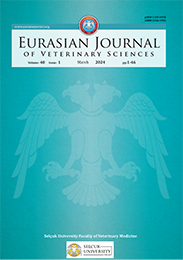| 2019, Cilt 35, Sayı 3, Sayfa(lar) 144-151 | |
| [ Özet ] [ PDF ] [ Benzer Makaleler ] [ Yazara E-Posta ] [ Editöre E-Posta ] | |
| The determination of effects of in ovo administrated bisphenol a on the development of thymus and proportion of alpha-naphthyl acetate esterase enzyme lymphocyte by using histological and enzymehistochemical methods in chicken | |
| Didem Yılmaz, Yasemin Öznurlu | |
| Selçuk Üniversitesi, Veteriner Fakültesi, Histoloji ve Embriyoloji Anabilim Dalı, Konya, Türkiye | |
| Keywords: ANAE, BPA, avian embryo, thymus | |
| Abstract | |
Aim: The aim of this study is to the determination of effects
of in ovo administrated Bisphenol A on the development of
thymus and proportion of alpha-naphthyl acetate esterase
enzyme lymphocyte by using histological and enzyme histochemical
methods in chicken. Materials and Methods: For this purpose, 310 fertile eggs, weighed 50-50 g, of Isa Brown laying parent stock were divided into 5 groups as control, vehicle- control , 50 100, and 250 μg/egg BPA. Test solutions were injected into yolk before incubation. At the 13th, 18th and 21st days of incubation, 10 eggs were opened from each group and blood and thymus tissue samples were taken from the obtained embryos. Results: On the 13th, 18th and 21st days of incubation, BPAtreated groups were found to be retarded embryonic development of thymus tissue compared to the control group. At the same time, in BPA-treated groups, lymphoid tissue had less cell density and the number of ANAE positive lymphocytes decreased. The percentage of peripheral blood ANAE positive lymphocytes was significantly lower in the BPA-treated groups than in the control groups (p <0.05). Conclusion: It has been found that BPA inhibits embryonic development of thymus, decreases ANAE positive lymphocyte rate. It was concluded that significant disturbances in the immune system function of the affected animals might be occured and regulation on the use of BPA should be revised. |
|
| [ Başa Dön ] [ Özet ] [ PDF ] [ Benzer Makaleler ] [ Yazara E-Posta ] [ Editöre E-Posta ] | |




